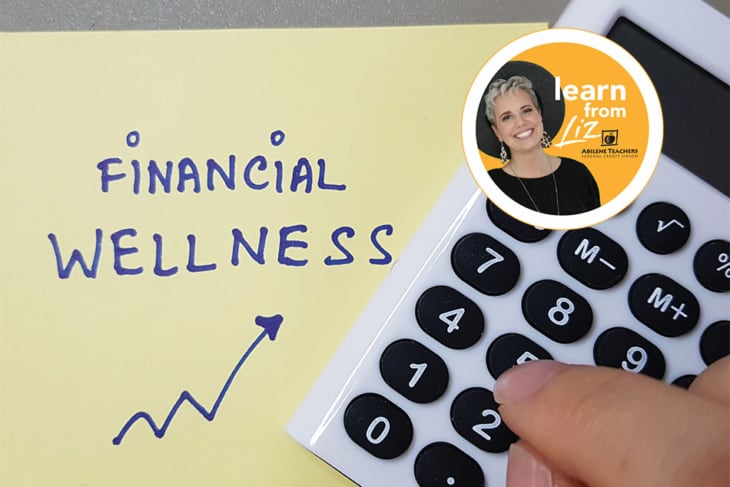12 Steps to Financial Wellness – Step 9: Build and Maintain an Excellent Credit Score

We are 3/4 of the way through our 12 steps to financial wellness. I hope you have been practicing steps 1-8 and are reaping the benefits. If you are just now tuning in, go back and start at Step 1 to get the full benefits of this program. This month we are going to talk about credit and the importance of it. Having good credit or bad credit can really make or break your financial future. The good news is you can always work to make it better, so let’s get started!
Your credit score is a crucial part of your financial health. The three little numbers measure the capacity of your credit, the proficiency of your money management and your fiscal responsibility. An excellent credit score can open the door to large loans with better interest rates, as well as employment opportunities and more. On the flip side, a poor credit score can be a strong impediment toward building wealth, funding large purchases and finding gainful employment. I know that one of the reports that are run when applying for employment at ATFCU is a credit check. A financial institution, cannot take the risk of hiring someone with miserable credit.
Let’s explore the best ways to build and maintain an excellent credit score.
Have Several Active Credit Cards
Many consumers mistakenly believe the path toward great credit is through swearing off all credit cards. However, building and preserving a healthy credit score requires owning a card or two and keeping them active. If you’re just starting out, consider signing up for a beginner’s card, which generally features easy eligibility requirements and a very low credit limit. In all other cases, be sure you have a minimum of three open cards and that you use them on a regular basis.
An easy way to keep your cards active without having an open balance would be to pay one fixed monthly bill, such as a subscription or monthly membership fee, with each of your credit cards. Set up an automatic monthly payment for the bill by linking your credit card, and then set up an automatic monthly payment for the credit card, too, by linking your checking account to the card. Choose to have the money transferred before the bill is actually due. This way, your cards will be open and active and you’ll never have a late payment, which would negatively impact your credit score. Several months of using your cards responsibly will generally help move your credit score upward.
Work on Paying Down Debt
If you’ve landed deep in debt and can’t find a way out, now’s the time to work on kicking that debt for good.
First, choose your debt-crushing method: The snowball method works by putting all available funds toward paying off the smallest amount of debt first, and then the next-smallest, until all debts are paid off. The avalanche method works the same way, but pays off the debt with the highest interest rate first, and then the next-highest, until all debts are paid off. With the snowball method, you’ll see results quicker, but may ultimately pay more in overall interest. Choose the method that works best with your personality, goals and lifestyle.
Next, list your debts. If you’re going with the snowball method, list in order from lowest amount to largest. If you’ve chosen to use the avalanche method, list your debts in descending order of interest rate.
You’re now ready to pay down those debts! Review your monthly budget to find a way you can trim your expenses, or look for a side hustle, and use the extra cash to maximize your payments toward the debt you’re working on first. Keep at it until you’re debt-free.
It may take a while to crush a mountain of debt, but showing the credit bureaus that you’re on track to pay off that debt can do wonders for your score.
Pay Your Bills on Time
Paying credit card bills when, or before, they are due is a major factor in determining your score. Carrying an outstanding balance, and/or owing lots of interest, shows that you are not timely with your bills and can’t be counted on to repay loans responsibly. As mentioned, you can set up automatic monthly payments for your bills so you’re never late. Just make sure you keep the source account you are paying from well funded to cover your payments as they are made.
Bring Down Your Credit Utilization Ratio
Another crucial factor contributing to your score is your credit utilization ratio. This refers to the amount of available credit you have and use. It’s best to keep your utilization under 30%, or even 10% if you can. To that end, make sure you’re using just a bit of your available credit each month. In addition, consider accepting offers for increased credit – as long as you know you won’t rack up huge bills just because the credit is available.
Keeping an excellent credit score is a key factor in financial wellness. Use the tips outlined here to build and maintain a great score.
A word to the wise – Abilene Teachers FCU offers a tremendously helpful tool called ‘Credit Score and More’ in our app and desktop banking platform. This feature coaches you on how to improve your personal score, prompts you on goal setting and allows you to check you credit score daily. It’s free to ATFCU members and we encourage you to give it a test drive.


